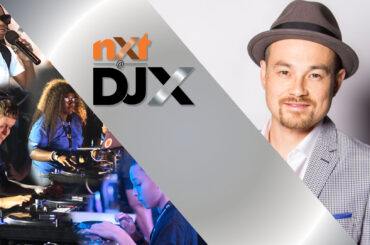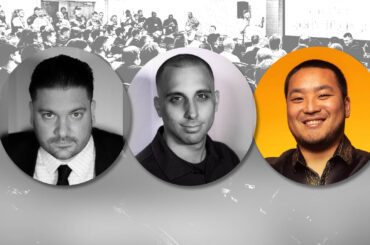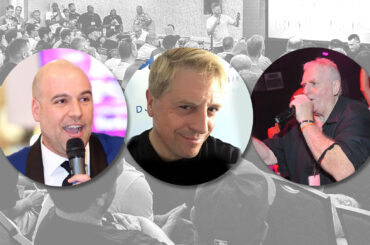Fans of frenetic beats, four-deck DJ mixing and a sweaty dancefloor had all they could handle this summer, when the “Blood Sweat and Bass” tour came to their town. Melding scorching drum-n-bass from genre leader Dieselboy and sub-stretching dubstep from Canadian DJ/producer Downlink, the tour’s stop at Webster Hall in New York City raged into the early morning.
Brooklyn-based Dieselboy (aka Damian Higgins) is no stranger to these pages. The perennial America’s Best DJ nominee has flown the flag for North American drum-n-bass since the ‘90s by touring incessantly, recording often and running several labels and sublabels (Planet Human, the umbrella label for SubHuman : Human Imprint).
We caught up with Dieselboy around his most recent New York gig to discuss the tour, his DJing approach and his dedication to a much-loved genre.
DJ Times: That show at Webster Hall was a scorcher. How would you describe the concept behind the “Blood Sweat and Bass” tour?
Dieselboy: Performance-wise, the concept is me and Downlink DJing our asses off and really trying to showcase a heavy dancefloor vibe. We both play on four decks and try to push the concept of technical mixing and layering. We put the focus on the skills, not the costumes, not the stage diving, not standing on the table, not the throwing of food products. Aesthetically, the “Blood Sweat and Bass” tour is all about “Gritty Grindhouse.” We like our graphics to reflect old movie posters and typography. It lends itself to the sound we are pushing.
DJ Times: What’s your DJ-booth set-up now?
Dieselboy: I like to play on four Pioneer DJ CDJ-2000s with a mixer, preferably a Pioneer. I like to use four decks because it allows me the freedom to layer a lot of stuff together, if I want to, as well always having stuff queued so I can keep my sets dense and fast-moving. You see a lot of “DJs” out there that have four decks onstage, but most don’t fully utilize that setup. They sort of bounce around between decks randomly. I use all of the equipment pretty intensely.
DJ Times: I read that you began DJing at high-school parties.
Dieselboy: The funny thing is that my experience DJing high-school dances—middle school, as well!—and my actual DJ career had nothing to do with one another in a weird way. It was until I was about four years into being “Dieselboy” that I even remembered that I had DJed school dances when I was younger. For some reason, I sort of blanked it out. Looking back, though, I can see that I was just always super-interested in music and showing my friends and people around me music that I enjoyed. That feeling has always been the undercurrent in all of this for me – sharing.
DJ Times: But eventually you became interested in underground club sounds. What was it about jungle/drum-n-bass that attracted you?
Dieselboy: When I began DJing clubs and raves, the music that we now know as jungle/drum-n-bass did not exist. It wasn’t a sound or a genre at that point. What I was playing at the time—U.K. hardcore/breakbeat—was the music that eventually splintered off and evolved into d-n-b. What I liked about the music was the clever use of breakbeats and really cool techno sounds. The music just had this raw futuristic and underground energy—the same reason why I still love drum-n-bass today.
DJ Times: Your favorite producers and record labels now?
Dieselboy: Producer-wise… Mefjus, Phace, Misanthrop, Prolix, Noisia, Audio, Upbeats, Mind Vortex, DC Breaks, Black Sun Empire and others in that vein. Label-wise… RAM, Vision, Neosignal, Blackout, Trendkill.
DJ Times: What was the scene like for you in the early ’90s when you began spinning underground events?
Dieselboy: Back when I started in Pittsburgh, the scene was just super-underground. It attracted people with an underground mentality. It was challenging to find shows to go to—you had to run across a flyer or a poster. There was very little internet and no world wide web, so you had to call information lines—answering machines—for event info. People were really into the music and the DJs. To be a raver, you really had to work for it. It was the polar-opposite of what you would consider “mainstream” in any way, shape or form – nothing like the way it is nowadays. I really enjoyed it. It felt real as fuck.
DJ Times: Going back to the genre’s beginnings, drum-n-bass fans are some of electronic music’s most dedicated—why is that? Is there something about the genre that makes people so loyal?
Dieselboy: Because drum-n-bass, at least in North America, is still underground. It is a challenging music. It isn’t casual music. It requires attention. So, people that love it tend to be very passionate about it. There is also the mentality that drum-n-bass hasn’t gotten the respect it deserves, so fans are really intent on embracing it and promoting it as much as they can.







